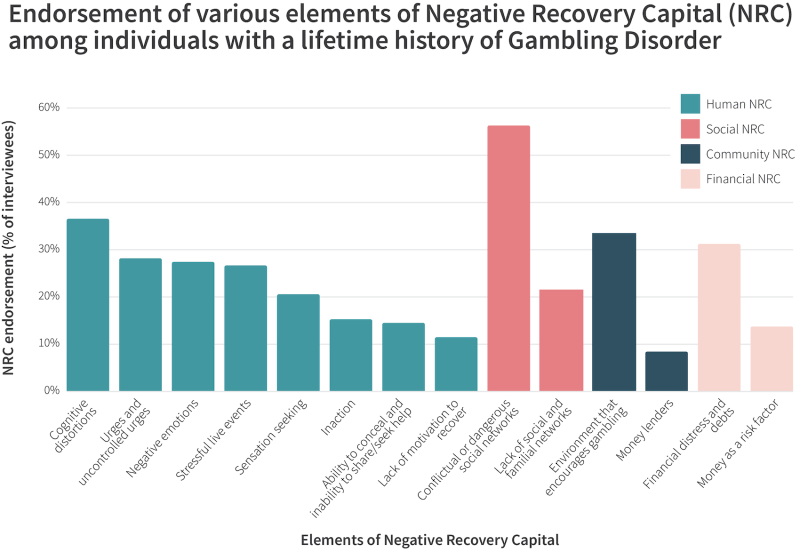Read the original article on The Basis website HERE.
By Kira Landauer, MPH
Recovery capital refers to the internal and external resources that an individual can access to start and sustain recovery from an addictive disorder. Existing along a continuum, recovery capital can be negative and impede an individual from enacting change and overcoming their addiction, or positive and help to enhance the recovery experience. This week, The WAGER reviews a study by Belle Gavriel-Fried and Niva Lev-el that identified and modeled elements of negative recovery capital (NRC) that might impede recovery from Gambling Disorder.
What was the research question?
What are the NRC elements that impede recovery from Gambling Disorder?
What did the researchers do?
The researchers conducted semi-structured interviews with 133 individuals with a self-reported lifetime history of Gambling Disorder. Participants were currently in treatment or had recently been treated in five gambling treatment centers in Israel and reported no co-occurring substance use disorder within the past year. The authors asked the research participants to describe factors that impeded or made their recovery process from Gambling Disorder more challenging. Next, the researchers analyzed the interviews using deductive and inductive qualitative content analyses. They categorized factors that impeded recovery into the four domains of recovery capital and then assessed their frequencies: (1) Human Capital (skills, personal traits, and knowledge); (2) Social Capital (family and friends, social networks); (3) Financial Capital (financial assets, such as money); and (4) Community Capital (community resources that promote social norms of a recovery lifestyle).
What did they find?
Fourteen elements of NRC were identified and categorized across the four domains of recovery capital. The majority of participants (82%) reported at least one NRC element in the domain of Negative Human Capital as a barrier to their recovery. This domain included negative emotional, cognitive, and behavioral states and negative life circumstances, including cognitive distortions, which were cited by 36% of participants (see Figure). Of the 14 NRC elements, the most frequently cited obstacle to recovery was conflictual or dangerous social networks, cited by 56% of participants. This NRC element is within the Negative Social Capital domain, which includes lack of support from family and friends. Sixty-three percent of participants cited at least one element in this domain as an obstacle to their recovery. An environment that encourages gambling and financial distress and debts were frequently cited NRC elements, and belong to the Negative Community Capital and Negative Financial Capital domains, respectively.

Figure. Frequencies for negative recovery capital elements that impede recovery from Gambling Disorder across the four domains of negative recovery capital (n = 133). Adapted from Gavriel-Fried & Lev-el (2022). Click image to enlarge.
Why do these findings matter?
These findings illustrate the many challenges and obstacles that might impede or hinder an individual’s recovery from Gambling Disorder, and this study is the first effort to map these elements across various domains pertinent to the recovery process. This study found that many elements that challenge the recovery process fall within the Human Capital domain, suggesting a focus be placed on addressing factors within this domain during recovery (e.g., addressing cognitive distortions through cognitive behavioral therapy or motivational interviewing). Findings from this study reinforce the importance of social networks in the recovery process, and highlight that unsupportive or conflictual relationships can hinder the recovery process. Clinicians should consider including family members into the treatment process and help clients manage relationships within their social networks. While it may be beneficial to prioritize these more common NRC elements, these results suggest that a holistic approach be taken to treatment and recovery. A tailored approach should address the full range of obstacles or challenges that might impede recovery across social, financial, personal, and community domains.
Every study has limitations. What are the limitations of this study?
This study used data from individuals without an active substance use disorder who sought help for their gambling. Findings might not be generalizable to individuals with an active substance use disorder, individuals who have not sought treatment for their Gambling Disorder, or to those residing in other countries.
For more information:
Do you think you or someone you know has a gambling problem? Visit the National Council on Problem Gambling for screening tools and resources.

